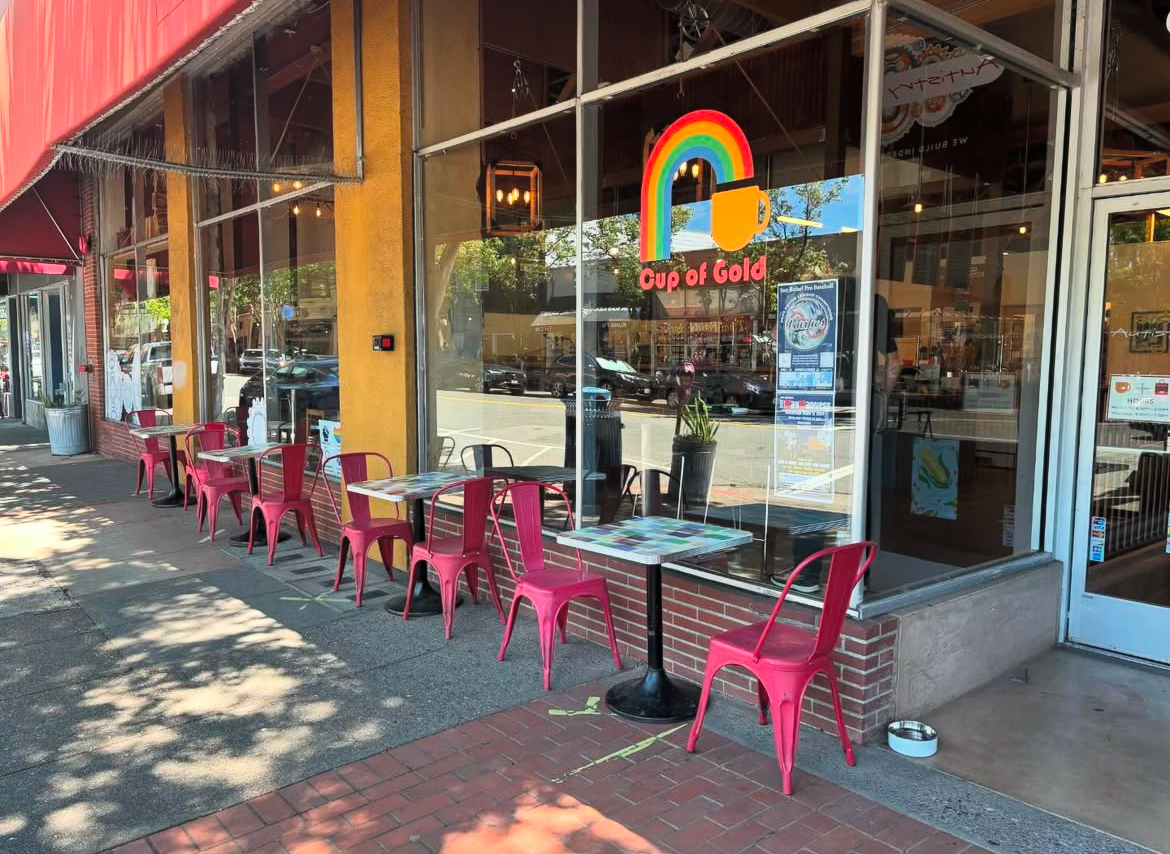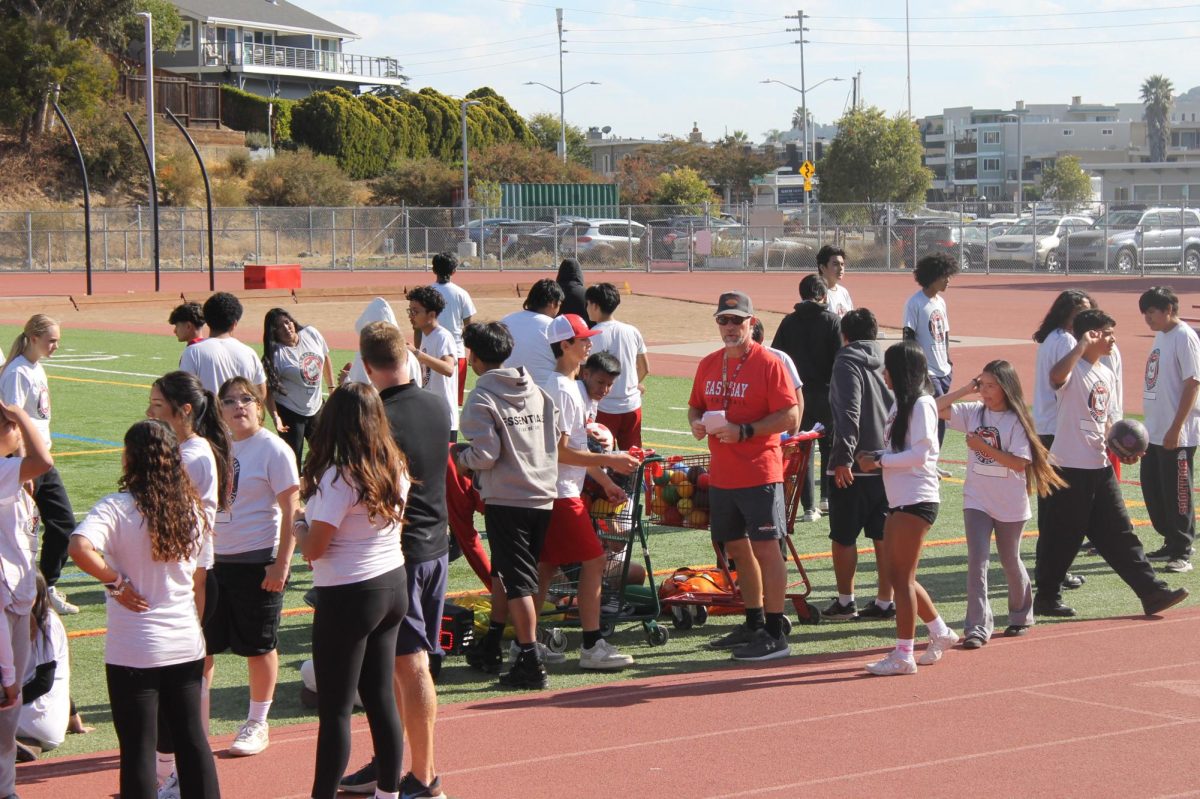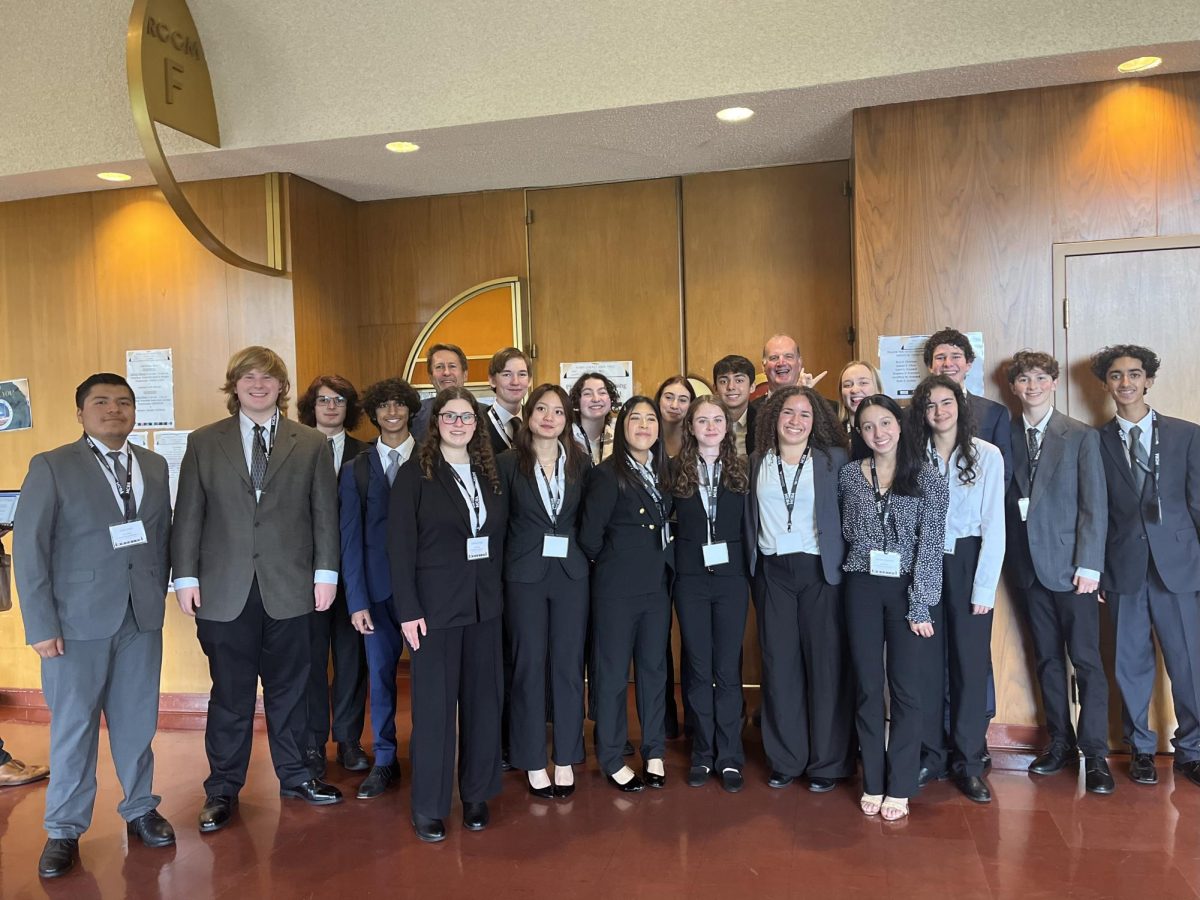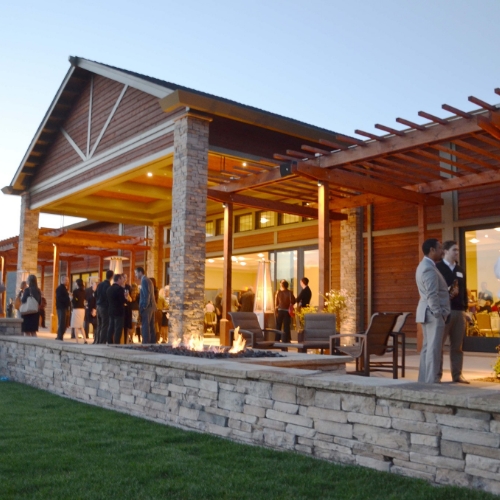“Objection!” Captain Marguerite Walden-Kaufman exclaims. It’s the middle of the first round of counties – San Rafael High School vs. Tamalpais High School, the defending state champs. Witness Gerri Moayed, played by Katherine Garcia, is on the stand. One of Tam’s lawyers is questioning her, but is stopped by the objection. Tam’s lawyer argues as to why the objection isn’t valid, but Walden-Kaufman argues back. It goes back and forth, until the judge finally makes a ruling.
Coach Mark Baker describes mock trial as “a place where students get to learn about the constitution and their civil protections, through practicing being attorneys and witnesses, in a made up case against other high schools.”
The members all study a fictional case. This year, it is about the murder of the CEO of Sunshine Medical Components, Kieran Sunshine. There are two sides – the prosecution and the defense. During a competition, the prosecution of one team goes against the defense of another and vice versa.
It plays out like a court case, with the defense and prosecution lawyers making a pretrial statement – they can request that the judge look closely at, or on the other hand, disregard evidence which has the potential to impact the outcome of the case. Then, a lawyer from each side gives a summary of the case for an opening statement.
After that, the lawyers on both sides question the witnesses and the witnesses use their statements, and general knowledge of the case, to respond. If a question is irrelevant or requires too long of an answer, or if a witness’ answer doesn’t fit with the witness statement, the other team’s lawyers can “object.” The judge determines if this is valid or not.
Towards the end, one lawyer from each side gets to make a closing statement. This is where they accumulate all of their important arguments to convince the judge to rule the case their way. The presiding judge makes a final decision on whether the client is innocent or guilty. This doesn’t determine the winner though – there is a point system used for this.
The participants receive points based on how they perform – clarity of speaking, confidence, objections – and these scores are combined to form an overall team score, and whichever side gets the most points wins the competition. The combined scores of the defense and the prosecution determine the county rankings.
It’s an activity where “law meets acting,” as captain Leyla Winton summarizes it.
The team has been led by Baker for the last 10 years. Former principal Glenn Dennis had asked him if he wanted to coach, and having never done mock trial, he accepted. He learned all about it, and has been the coach ever since.
With his deep voice he starts off a practice in January by giving an overview of the upcoming practice and competition schedule. Then he plays a video with a message – an incredible football player pointing out that it’s not about talent, it’s about effort. He relates this to mock trial, encouraging them to put in the extra work before “counties,” a pair of weekends where each team plays four of the other eight Marin County mock trial teams at the Marin County Civic Center.
Whether it’s handing out fist bumps in the hallways during passing periods or helping mock trial members with their homework at practice, he demonstrates his care for SR students. Walden-Kaufman says he is “consistent, dedicated, and he just has a good heart.”
In addition to a teacher-coach, they have two attorney coaches, Peter Arian and Rob Epstein. Epstein has coached for 13 years, since the SR mock trial team restarted. His son was a sophomore at the time, and is now a first-year law student. He commits hours of his week to coaching this team and reports that he has “seen tremendous improvement from each and every member of the team this year… they are a remarkably sweet, funny group of people – hailing from all four grades and all corners of our community — who are each so connected with one another.”
The team is also led by two captains: Walden-Kaufman and Winton. Both are seniors who have been doing mock trial since freshman year. This is their second year as captains. They help recruit people, plan practices, and build the mock trial team culture.
“They’re just in the sweet spot of motivating us to get the work done and being really nice,” says Reed Sadownick, a freshman on the team.
They each lead one side. Winton is the defense leader. At the beginning of practices, after Baker played his inspirational video, she had a task for the team – an exercise that focused on embodying their character, where they pick one adjective and make that their defining character trait. Explaining it with encouragement and constructive criticism, it worked to prepare them for their next competition. She’s been a lawyer for four years, even though people aren’t usually lawyers that early on in their mock trial careers. “Because she’s been a lawyer for all four years, it’s allowed her to really hone in on her skills,” says Walden-Kaufman.
Walden-Kaufman leads the prosecution, where they try to prove that the defendant’s client is guilty. Her dedication, her way of speaking calmly under pressure, and her perseverance in objections have led her to excel at this activity. She has gotten multiple awards, one of which was the MVP award at their competition against Tam.
After this competition, two of the Tam coaches went up to Walden-Kaufman (each at a different time) and told her how wonderful she performed. One expressed how she was natural – that she didn’t rely so heavily on acting – and that it made her believable. He continued to say how she would be a great lawyer.
Overall, they have improved mock trial’s structure from past years, as Alondra Maldonado, a senior on the team, has noticed. Whether it’s specifically going up to people and convincing them to join, or planning a movie night (Legally Blonde of course), Walden-Kaufman and Winton have put in so much effort to help this team succeed. They have helped the members feel connected, and it’s positively shaped this team into what it is now.
It’s not only the captains that make this team great; Winton reflects that this team has “the drive,” and that there are many new members who have roles, and have put in so much time and effort to improve. These members will hopefully be the future of the team, and continue to create a culture of development and fun.
When asked about how mock trial has helped them, members of the team reported that they’ve seen an improvement in their public speaking, writing, confidence, and knowledge of law.
Maldonado has seen this improvement. She says that she’s “been able to not only find my voice, but be able to use it to help people… through mock trial I felt empowered to start my own project.” This project is called Apoyo and offers tutoring to newcomer students, aiming to help them graduate.
This improvement came throughout their long season. Spanning from August to February, it goes longer than a normal high school sports season. They started off with practices in August, and an “internal scrimmage” in October (where the SR prosecution went against the SR defense). Then they went against Alhambra High School, Menlo High School, California High School, and Alhambra High School again. In the last weekend of January, and the first weekend of February, they had the two rounds of counties.
In the morning, SR’s prosecution played Tam’s defense (who are the defending state champs). In the afternoon, SR’s defense went against Redwood’s prosecution. The prosecution rose to the occasion, and did extremely well in the competition against Tam, but the state champs pulled out a win. The defense just barely lost to Redwood.
The following weekend, SR’s defense lost to Terra Linda’s prosecution by just a little bit. Then, SR’s prosecution won against San Marin’s defense! There was an awards ceremony that afternoon and many people from SR got awards. Only five prosecution attorney awards were given out for all Marin teams, and Marguerite Walden-Kaufman and Hadassah Krieger got two of the five. Serena Killingsworth, Nikash Shaw and Reed Sadownick all got witness awards. A bailiff award was given to Walter Armas.
For many people, it hasn’t only been about winning. When asked to describe mock trial in a word or phrase, Winton responds with “family.” She said, “We’re a really close group – we know each other’s strengths and weaknesses and we push each other and we support each other, and it really is like a family to me.”







































